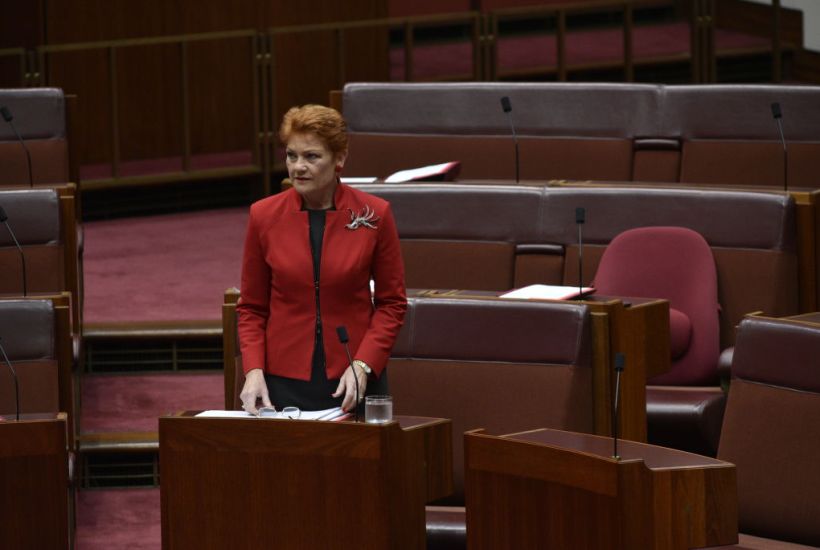One Nation positions itself as pro-Australia but the party’s opposition to company tax cuts shows it is short-sighted and weak on the economy, and it’s time for voters and commentators on the right to hit them hard for it.
The party’s announcement last week that it will probably block further company tax cuts in the Senate comes as no surprise, though it should give pause for conservatives who have been flirting with voting for the minor.
What a joke that a supposedly right-aligned movement could oppose tax cuts, particularly when a conservative American leader like Donald Trump has made his recent reductions a flagship achievement.
The positive impact there is already clear.
In Australia, most workers haven’t had a proper pay rise since the end of the mining boom.
They’re expecting leadership from politicians to create an environment where they’re not worried about job losses.
Cutting corporate tax delivers on this- it would grow wages and improve job opportunities, and to conservatives it should make intuitive sense why.
Businesses want to make a return for their investors.
Paying less tax makes it more worthwhile to invest into Australia, boosting productivity and wages over time.
To sell a product, an enterprise needs money to buy equipment and workers to use to operate it.
Cutting the tax rate gives an incentive for businesses to invest in new machinery, and with that comes more employment and also improved productivity, which drives wage growth.
On the flipside, higher taxes here make projects overseas more profitable.
Why does One Nation want to give other nations a free kick against us?
We’re competing internationally, and at the moment, we’re losing.
Brazil is challenging Australia in iron ore mining; farmers from Ukraine are taking market share in grain.
I don’t even need to mention manufacturing.
And after investing hundreds of billions here in the past decade, energy businesses have put off growth projects and looked overseas to places like the US, instead.
Hanson rightly acknowledged that payroll taxes should be cut as a job creator, yet she argues company tax reductions won’t work.
Seems inconsistent.
Trump understands that if you want to create jobs and make your citizens richer, you need to get the right climate for business.
Some conservatives in Australia put Pauline Hanson on a pedestal, and say she’s “our Trump”.
How ironic that it is Malcolm Turnbull pushing the pro-Aussie economic agenda, a policy close to Trump’s, while she opposes it?
Consider this.
Much like the Greens, One Nation benefit from never having to enact any of its promises.
Look at the 2016 commitments.
A Royal Commission into Islam, banning the burqa- neither happened.
It is easy for Hanson to grandstand and show her contempt for political correctness if she never has to worry about delivering.
Aside from conservative virtue signalling, and perhaps catharsis for many from her push against identity politics, Hanson achieves less than voters might hope on policy.
Sure, she is to be commended for her scrutiny of the ABC, and for some positions on industrial relations and government spending.
But Hanson needs to do more than just appease her base, however: she needs to help fix the country.
Trump, by contrast, talks the talk on stopping political correctness while he also walks the walk on things that impact ordinary voters.
Ultimately, feeling safe and having a secure income to support a family are the two biggest election winners, and Trump delivers both in spades.
Pauline Hanson, on the other hand, although appearing strong on immigration and security, is inconsistent on the economy.
On immigration and security, she struggles to deliver because she has strong support from her base, and not from many other voters.
On the economy, well, I’ll never forget her famous interview in the 1990s where she suggested we print more money to pay for spending.
She has come some way since, advocating reform of penalty rates, supporting the re-establishment of the ABCC and helping cut welfare.
Nonetheless, One Nation still wants re-nationalisation in the banking industry, so it isn’t as if they’re particularly consistent.
Tax cuts are the easiest test as to whether someone wants to support private business or bigger government- so let this be the test if she’s on Australia’s side or her own.
Matt Mckenzie is a Perth business journalist. Views are his own.
Got something to add? Join the discussion and comment below.
Got something to add? Join the discussion and comment below.
Get 10 issues for just $10
Subscribe to The Spectator Australia today for the next 10 magazine issues, plus full online access, for just $10.


























Comments
Don't miss out
Join the conversation with other Spectator Australia readers. Subscribe to leave a comment.
SUBSCRIBEAlready a subscriber? Log in